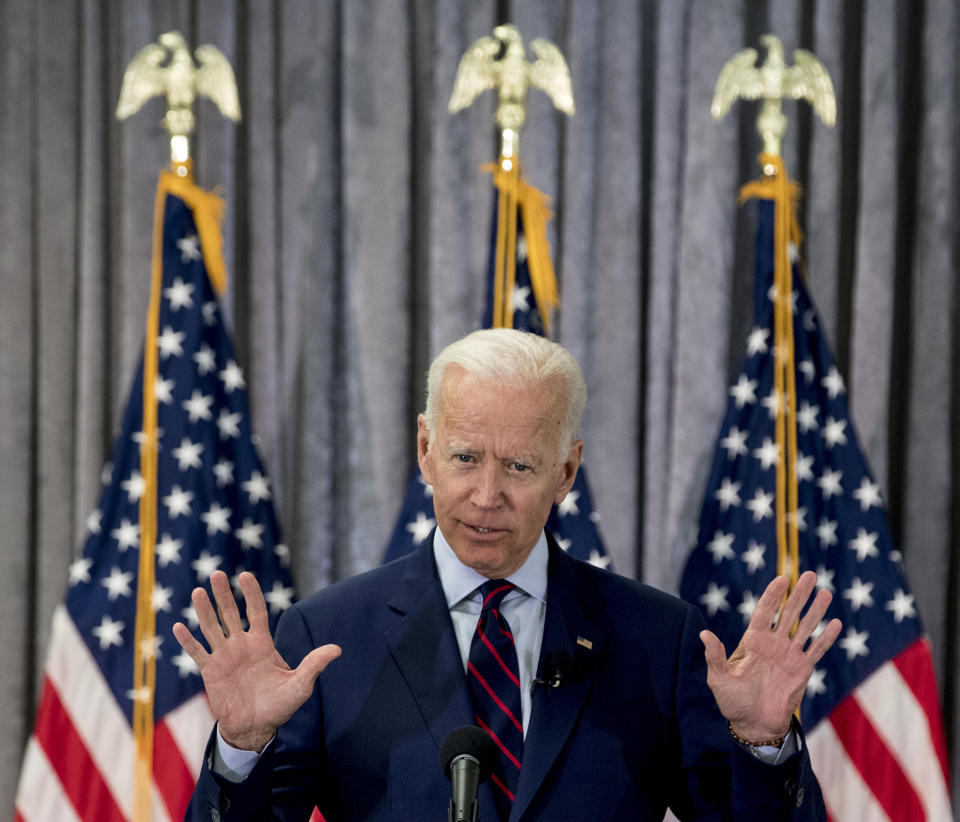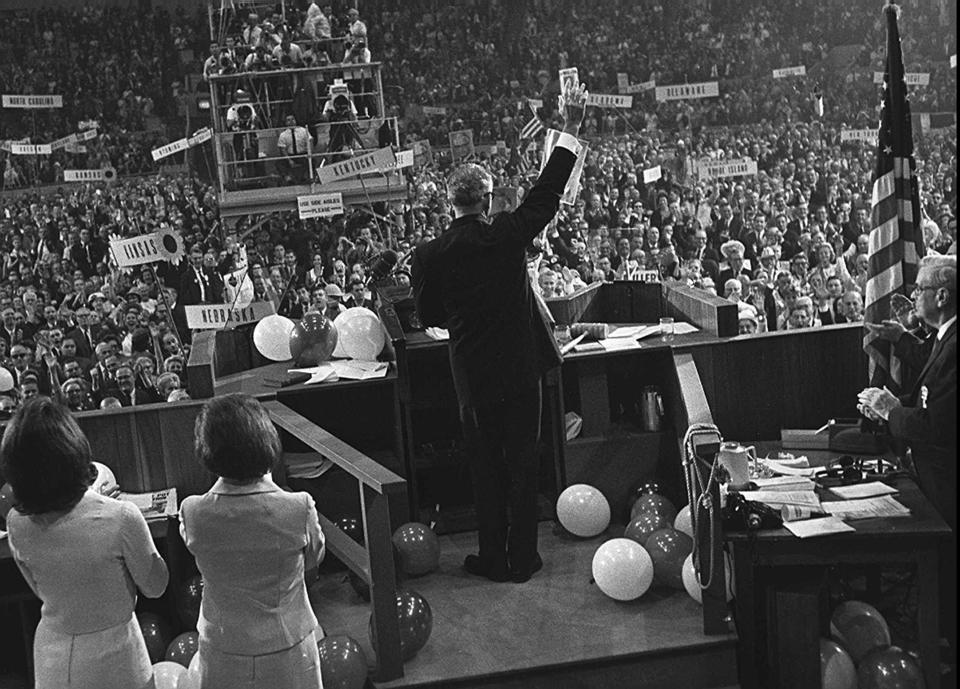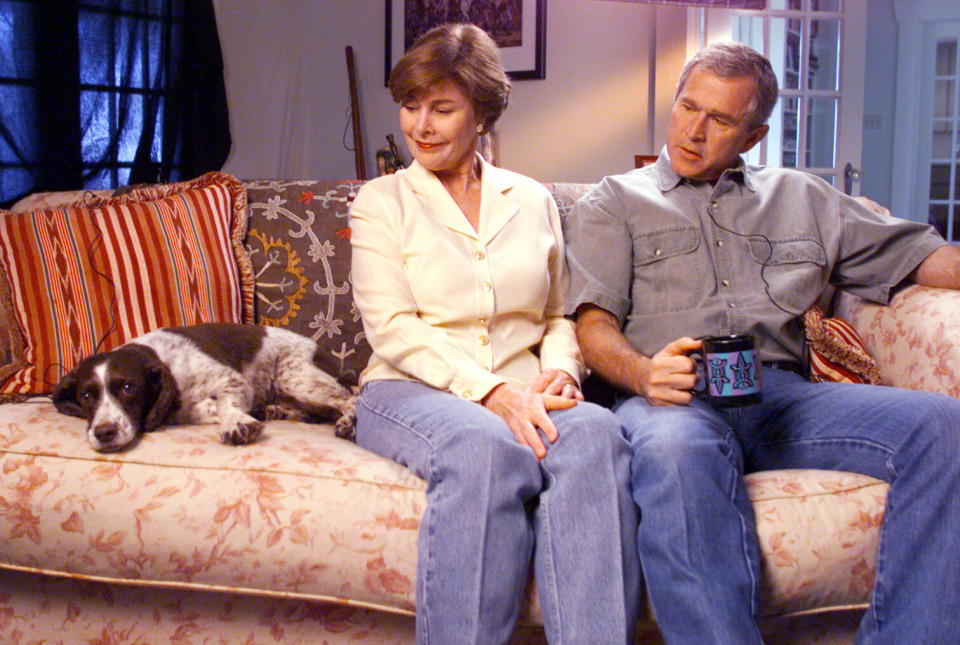Joe Biden Has Been Saying 'It's Not Your Father's Republican Party' For Years
“Folks, this is not your father’s Republican Party,” 2020 presidential candidate Joe Biden likes to say when he’s actually on the campaign trail these days.
It’s a familiar line ― paraphrased from your father’s ad industry ― that the former vice president and longtime senator has repeatedly deployed over the years to convince swing voters that the GOP isn’t for them anymore.
“This is not your father’s Republican Party,” Biden said campaigning for a Senate candidate in 2018. “They are not who we are. They are not who America is.” Not with their “phony populism” or “fake nationalism.”
“This is not your father’s Republican Party,” he said in 2011. “This is a different breed of cat.”
“Today’s Republican Party is not your father’s Republican Party,” Biden said in 2010. “It’s the party of the tea party. … I’m not questioning their integrity. I’m questioning their judgment.”
“I don’t get it,” Biden said during the close of the 2008 election with Sarah Palin his GOP opponent. “This is not your father’s Republican Party. This is a different deal. This is a different outfit.”
“This is not your father’s Republican Party,” Biden said in 2006, his first recorded utterance. Republicans are “bright, patriotic people,” he added, who, sadly, “want to radically change the social structure that has nurtured a thriving middle class.”

If you were 4 years old when Biden started warning people that the Republican Party wasn’t your father’s Republican Party, you will be able to vote in the 2020 election ― for or against the Republican Party.
The tactic of painting your political opponents as no longer representative of the party the voters once knew goes back, at least, to Biden’s father’s day.
“I’ve always been a Republican,” William Bogert, a Republican actor appearing in a 1964 ad for Lyndon Johnson’s presidential campaign. “My father is, his father was. The whole family is a Republican family. I voted for Dwight Eisenhower the first time I ever voted. Goldwater, now it seems to me we’re up against ― a very difficult kind of a man. This man scares me.”
Barry Goldwater, the 1964 Republican presidential nominee, wasn’t like your father’s Republican Party. He was different. “This man scares me.”

But Goldwater wasn’t a blip. His nomination was the beginning of the conservative movement takeover of the Republican Party that culminated with the presidential election of Ronald Reagan in 1980 and the House speakership of Newt Gingrich in 1995.
As the Republican Party of the 1980s and 1990s ― the one that Biden worked with for the better part of his career ― increasingly reflected Goldwater’s extremism, people of Biden’s age could say then that it was no longer your father’s Republican Party.
“It’s really important to keep in mind this is not your father’s Republican Party we’ve got right now,” conservative columnist Paul Gigot said in 1995.
What was once a “largely economic conservative based party,” Gigot argued, was by then run equally by the business faction and the social and religious faction.
It was this new version of the party that came to be seen as uncompromising, punitive and manic under Gingrich’s leadership in the 1990s. It needed a rebrand.
“[A] big part of our message is that this is not your father’s Republican Party,” Mark McKinnon, political adviser to George W. Bush, said in 2000.
The Bush team pitched its “compassionate conservatism” with a cooler, relaxed vibe aimed at the youth ― or at least older people who like to believe they are enjoying something designed for young people. The Bush campaign featured pictures of the then-Texas governor tieless, with his shoes off and his sleeves rolled up. The hip sounds of Dean Martin came over the CD player.
This pitch purposefully served cross-purposes. It sought to separate Bush from the nasty image of Gingrich and other congressional Republicans in order to appeal to swing voters and Democrats ― while also separating Bush from his father, who had been abandoned by the hardcore conservatives after he broke his no-new-taxes pledge.

“Literally and figuratively, the goal is to demonstrate that this is not your father’s Republican Party,” Kellyanne Conway, then a pollster for the Republican Party, said in 2000.
And six years later, Biden started telling voters that Bush’s Republican Party wasn’t his father’s Republican Party.
The line has always been used to serve narrow electoral interests. Sometimes for good, sometimes for ill.
In 2013, Chris Cillizza and Aaron Blake wrote a Washington Post piece titled, “Why Democrats should listen to Joe Biden,” specifically about his comment that “this is not your father’s Republican Party.” That message, particularly the focus on Sens. Ted Cruz (R-Texas) and Rand Paul (R-Ky.), “works to rev up a Democratic base” and increase “their desire to give money and/or show up at the ballot box in 2014,” the two pundits said. They also postulated that the message could help Democratic senators in solid Republican states, like Missouri’s Claire McCaskill and Indiana’s Joe Donnelly, attract independent voters and win reelection in 2018.
The 2014 midterm elections saw the lowest turnout in 72 years and Democrats lost nine Senate seats and control of the chamber. McCaskill and Donnelly lost reelection in 2018.
Love HuffPost? Become a founding member of HuffPost Plus today.
Related Coverage
The Biggest Divide Among 2020 Democrats Is How To Pass The Party’s Agenda
Joe Biden Slams 'Divider-In-Chief' Trump In Philadelphia Campaign Kickoff
Joe Biden Responds To Trump Parroting North Korean Propaganda About Him
Joe Biden Tackles Education In First Major Policy Proposal Of 2020 Campaign
This article originally appeared on HuffPost.

